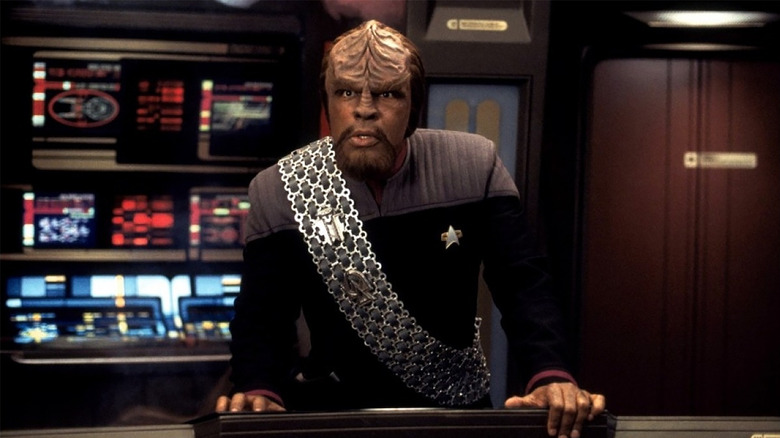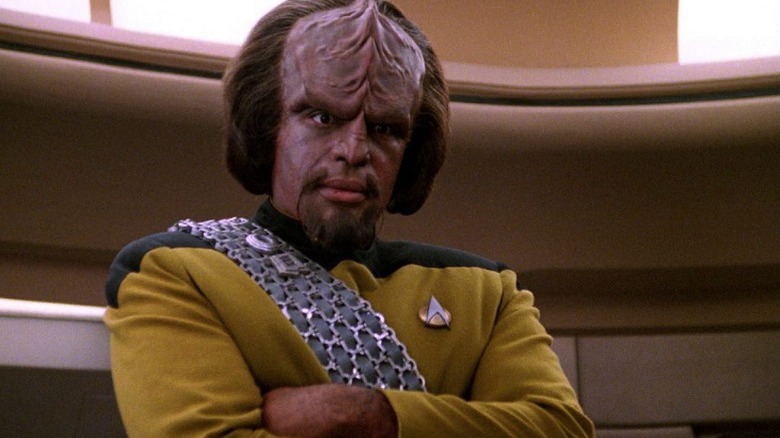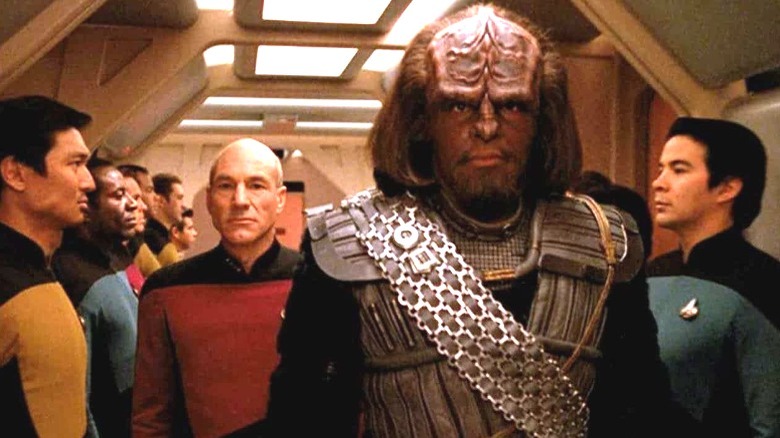How Michael Dorn Helped To Create Star Trek's Klingon Culture
"Star Trek" has introduced an endless array of alien cultures over its decades-spanning history, but perhaps none are as immediately recognizable as the Klingons. Even to those uninitiated in the world of "Trek," the Klingons have become a symbol of the franchise itself, playing significant roles in all of the series since the original. Out of the long line of Klingon characters, it's the Enterprise's Chief Security Officer Worf, played and greatly characterized by Michael Dorn, who is arguably the most responsible for establishing the warrior race as one of the preeminent faces of Trekkie iconography.
The Klingons may have been a part of the "Star Trek" universe since its early days, but it took years to build their full culture, history, and lore. Introduced in the 26th episode of "Star Trek: The Original Series," titled "Errand of Mercy," the Klingon Empire started off as barbaric and violent, acting as antagonists to the peaceful Federation. It wasn't until "Star Trek: The Motion Picture" that the Klingons' iconic ridged foreheads and (now fully developed) language appeared, and even then the race's defining cultural traits were largely absent. Everything changed with "Star Trek: The Next Generation," however, when Michael Dorn's portrayal of the heroic Worf added a new layer of complexity to the previously villainous aliens.
Qapla'! Worf Is born!
The Klingon Empire had entered into an alliance with the Federation at the time of "The Next Generation," and Starfleet got its first Klingon officer in the form of Worf. Despite this momentous shift in "Star Trek" politics, series creator Gene Rodenberry didn't have any specific ideas in mind for the character. That's where the man playing him came in. In an interview that Dorn had with TrekZone Network during the German sci-fi convention FedCon in 2010, he recounted:
"They didn't tell you how they wanted the character to be – nothing. You went in to audition for this character name and that was it. When I started, before I came onto the set, I went to Gene Roddenberry and said, 'Hey, what do you want from this guy? Who is he?' And being as smart as he is, he said, 'don't listen to what you've heard or read or seen in the past, nothing. Just make the character your own.' And that's what I did."
Dorn explained that he helped to bring "a little more of who they [the Klingons] are outside of these war-like creatures" that were first established in "The Original Series." Instead of a one-dimensional brutality, the Klingons embraced a complex warrior ethos, a transition which Dorn helped to usher in with his booming proclamations of the strict Klingon honor code. Throughout the run of "The Next Generation" and its follow-up series, "Star Trek: Deep Space Nine," the bonds and tensions between the (mostly) pacifist Federation and the aggressive Klingon Empire made for fascinating explorations into the way two societies with seemingly opposing ideals could still operate together.
Working with Worf
The first Worf-centered episode, season one's "Heart of Glory," explains the Chief Security Officer's background and serves to introduce his inner conflicts as a Klingon serving in Starfleet. Dorn's own way of performing Worf's mannerisms reflect that awkward outsider identity, from his stern, deep voice to his manner of speaking in such a literal fashion that it was sometimes played for laughs. "The Next Generation" fans will point out that Worf was often used as a punching bag for various enemies in the early seasons, but Dorn helped to mold him into a more combative warrior by helping to create the unique system of Klingon martial arts.
Visual effects producer Dan Curry worked with Dorn to develop this fighting style and gave the Klingons Worf's favorite weapon, the iconic bat'leth double-edged sword. Dorn also credits writer (and future "Battlestar Galactica" remake creator) Ronald D. Moore, who penned much of the Shakespearean drama revolving around the feudal Klingon Empire's rival royal houses, with crafting the most memorable Klingon episodes in both "The Next Generation" and "Deep Space Nine." These other creative contributions aside, Dorn's personal input defined Worf's character from the very beginning and kickstarted the evolution of Klingon culture.


